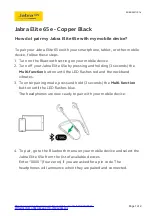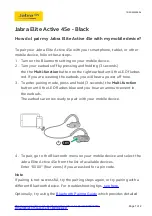
Shure Incorporated
7/9
•
•
•
1.
2.
•
•
•
•
•
•
Reassembling the Nozzle
Caution:
Do not force parts.
Reposition as necessary to assure a smooth and easy fit.
Ensure the threads are properly engaged before using the nozzle key.
Tighten the threaded collar just enough to ensure it will not loosen during normal earphone usage.
Insert the nozzle into the earphone, aligning the tabs on the nozzle with the opening on the earphones.
Turn the threaded collar all the way into the earphone housing using the nozzle key.
Cleaning the Earphone Nozzle
If you notice a change in sound quality, remove the sleeve and check the nozzle of your earphone. If nozzle is blocked, clear
obstruction by using wire loop end of cleaning tool.
If no obstruction is found or if sound quality does not improve, replace the sleeve with a new sleeve.
Caution:
When cleaning, do not force any object through the earphone nozzle! This will damage the earphone sound filter.
Warning:
The cleaning tool is only to be used to clean the earphones. Any other use, such as using the tool to clean ears or foam sleeve, could result in injury.
The cable connectors to the earphones may collect debris or other deposits that can affect audio quality. If this happens, disconnect the cables and clean them
using a dry cotton swab.
Maintenance and Cleaning
Careful maintenance ensures a tight seal between the sleeve and nozzle, improving sound quality and product safety.
Keep the earphones and sleeves as clean and dry as possible.
To clean sleeves, remove them from earphones, gently rinse in warm water and air dry. Foam sleeves require a longer
drying time. Inspect for damage and replace if necessary. Ear sleeves must be completely dry before reusing.
Wipe the earphones and sleeves with mild antiseptic to avoid infections. Do not use alcohol-based disinfectants.
Do not expose earphones to extreme temperatures.
Replace sleeves if they do not fit properly.
Do not attempt to modify this product. Doing so will void the warranty and could result in personal injury and/or product
failure.



























